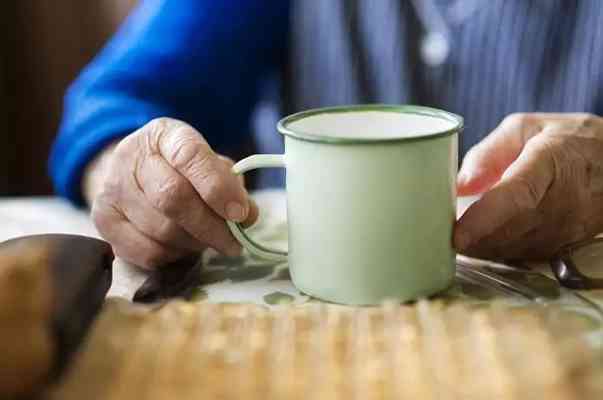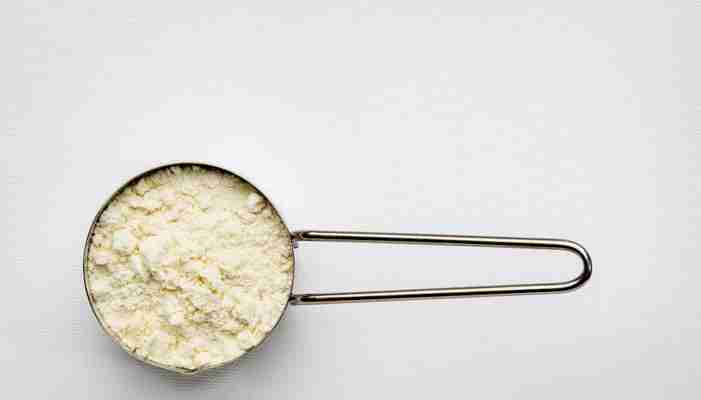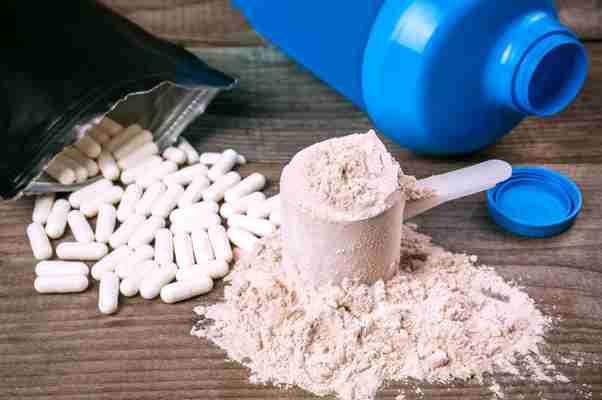Is Whey Protein Beneficial for Malnutrition in the Elderly?
A recent study determines whether the use of whey protein in the management of malnutrition in the elderly has a suppressive effect on subsequent energy intake.

Whey protein is a natural protein supplement derived from milk and is frequently used for maintenance of lean muscle mass and management of malnutrition in the elderly. Malnutrition, both as undernutrition and obesity, is becoming more common in older men and women. This can result in significant loss of mobility and a poor quality of life. Therefore, it is important for the elderly to restore skeletal muscle mass and function with the help of supplements. Consuming whey protein is a convenient and effective way for them to meet their daily protein needs.
However, the effect of whey protein on energy intake and gastrointestinal mechanisms is not well understood in older men and women. Previous studies have shown that administration of oral whey protein loads suppressed subsequent energy intake by 12-17% in young people while having no suppression in healthy older men.
A new study published in the American Journal of Clinical Nutrition investigated the effects of whey protein on malnutrition in the elderly. Specifically, the study looked at whey protein’s effects on energy intake, appetite, gastric emptying, and gut hormones in the elderly. The study included eight men and eight women with an average age of 72 years and an average BMI of 25kg/m2. Each participant was given two oral whey-protein loads of 30 g (120kcal) and 70g (280kcal) and a flavored-water control drink. They were then studied on three occasions separated by three to 14 days. The effects of whey-protein loads were determined on energy intake, gastric emptying, perceptions of appetite, and gastrointestinal hormones [e.g. ghrelin, cholecystokinin, glucose-dependent insulinotropic polypeptide/gastric inhibiting polypeptide (GIP), glucagon-like polypeptide-1 (GLP-1), and peptide tyrosine tyrosine (PYY)].
Participants were given a standardized evening meal on the night before each study day. On the study day, the participants ingested the drink and their total gastric volume, perceptions of appetite and gastrointestinal symptoms were measured before ingesting the drink, immediately after and at 15-minute intervals until 180 minutes. At 180 minutes, each participant was asked to consume a buffet-style meal until they were comfortably full. The amount that was eaten at the buffet meal was calculated by weighing the food before and after consumption and energy intake (kilocalories) was calculated using a software program. Researchers withdrew blood to measure the plasma concentrations of gastrointestinal hormones.
The results showed that energy intake at the buffet meal was approximately 80% higher in older men than in women. However, consumption of protein drink or control did not significantly suppress the energy intake at the buffet meal.A dose-dependent effect of the protein load was observed on the total energy intake in both men and women (control: 843 + 77 kcal; 30 g protein: 923 + 75 kcal; and 70g protein: 1073 + 78 kcal).
There was found to be a dose-dependent effect of whey-protein load to slow gastric emptying, with no difference in the rate of gastric emptying between men and women. In addition, the protein load caused an increase in the plasma concentrations of insulin, glucagon, ghrelin, cholecystokinin, GIP. GLP-1, and PYY. However, the effects of protein load for hunger, desire to eat, fullness, nausea, and bloating were not significant.
Clearly, the protein drinks did not suppress subsequent food intake in older men and women. As a result, there was a dose-dependent increase in total energy intake (preload drink plus subsequent meal) in both men and women compared with that of the control drink. These results indicate that protein doses sufficient to cause protein muscle deposition can be safely consumed by the elderly without a loss of appetite or a decrease in overall energy intake.
This study has some limitations. The number of participants was very small which may have underpowered the study. The energy intake was assessed only at 3 hours after protein intake and not during the rest of the study day. Older women usually have lower energy requirements than older men but the study design allowed the drinks to be isocaloric for both men and women.
In conclusion, the consumption of whey-protein drinks for the management of malnutrition in the elderly has no effect on the subsequent energy intake 3 hours after consumption. Therefore, an increase in total energy intake is achieved by consumption of whey-protein drinks. This suggests whey-protein drinks are a good choice for elderly individuals who need to pay extra attention to their protein requirements.
Written by Preeti Paul, MS Biochemistry
Reference: Caroline Giezenaar, Laurence G Trahair et al. Effects of randomized whey-protein loads on energy intake, appetite, gastric emptying, and plasma gut-hormone concentrations in older men and women. Am J ClinNutr, July 2017.
Add to Flipboard Magazine.
What Are the Dangers of Protein Shakes?
Protein shakes – commonly derived from milk, soy or eggs – can supply high-quality protein to your diet. Despite their ease of use, however, they can be dangerous to your health. Your individual physiology can determine how well you tolerate them, but, even if you have no problem in that regard, protein shakes can be a source of toxicity that might lead to health problems. These supplements also have the potential to impact your overall nutritional well-being.

Allergy
Food allergies develop when a specific protein triggers an exaggerated immune response in your body. Although more common in infants and children, food allergies can persist to adulthood or even begin when you are an adult. Cow’s milk, soy protein and eggs can elicit an allergic reaction in susceptible individuals, and protein shakes containing these ingredients can cause symptoms of vomiting, diarrhea, dehydration and shock.
Digestive Upset
Protein shakes made from milk can contain variable levels of the milk sugar lactose. If you experience lactose maldigestion or are completely lactose intolerant, your intestinal tract manufactures too little of the digestive enzyme lactase, or even none at all. Without enough of this enzyme, you can’t break down lactose. Instead, the sugar moves through your gastrointestinal tract undigested, and bacteria in your gut can feed on it, producing gas. Other symptoms of consuming protein shakes containing lactose can include abdominal pain, bloating and diarrhea.
Organ Damage
The convenience of drinking protein shakes can make it easy to consume more of this nutrient than your body needs. If you are healthy and exercise regularly, excess protein intake might not affect your organ health. However, if you suffer from kidney disease or are at risk for developing it, too much protein may lead to a worsening of your condition, as your kidneys work overtime to process the excess nitrogen released during protein metabolism.
Heavy Metals
Protein shakes, because they are a food supplement, are not regulated by the U.S. Food and Drug Administration in the same way as pharmaceutical products. Manufacturers, therefore, might not test supplements for toxins or might fail to disclose harmful ingredients in their products. Independent testing labs have found heavy metal contamination, including cadmium, arsenic and lead, in many protein shakes. These metals can accumulate in your tissues over time and lead to chronic toxicity.
Obesity
Even if consuming excess dietary protein from protein shakes does not harm your kidneys, it can cause you to gain unwanted weight. Because your body does not store any excess amino acids you consume, they either burn as fuel or get stored in your body as fat. If the surplus protein you take in causes you to exceed your daily calorie needs, you increase your risk for becoming overweight or obese.
Malnutrition
Recommended Protein Powder Supplements for Cancer Patients
Always consult with your doctor before adding any dietary supplements to your daily regimen, including protein powders and protein shakes. Image Credit: vovashevchuk/iStock/GettyImages

Cancer and cancer treatments can have a major effect on appetite and increase the risk of malnutrition. Not getting enough to eat may also increase the risk of complications. Protein shakes for cancer patients may serve as a simple source of nutrition that supports the cancer fight.
Advertisement
Video of the Day
Tip Always consult with your doctor before adding any dietary supplements to your daily regimen, including protein powders and protein shakes.
Cancer, Appetite and Malnutrition
Good nutrition is important for everyone, but it's especially important for those fighting cancer. Between the disease and the treatments, you may feel as though your body is under constant attack. According to the National Cancer Institute (NCI), eating healthy may help you maintain your weight, improve your strength and decrease the side effects of your treatment.
Advertisement
Unfortunately, both the cancer itself and the treatments can make eating difficult. According to NCI, some forms of cancer alter the way your body uses nutrients, including protein, fat and carbohydrates. Even if you're eating enough, the cancer may affect your body's ability to absorb the essential nutrients from the food you eat.
Advertisement
You may not have much of an appetite when you're fighting cancer. Plus many cancer treatments cause side effects such as nausea and vomiting, diarrhea, difficulty swallowing, taste changes and dry mouth.
All of these factors increase your risk of weight loss and cachexia, which is a medical condition characterized by weight loss, muscle wasting and lack of strength. According to a December 2016 systematic review and meta-analysis of cohort studies published in Nutrition Reviews, adherence to a high-quality healthy diet increased survival rates among cancer patients.
Advertisement
Read more: 10 Foods Linked to Cancer You Need to Stop Eating
Strategies to Improve Nutrition
Given the role nutrition plays in cancer treatment, nutrition therapy may be part of your treatment plan. If you have a poor appetite or you're losing weight, you may be referred to a registered dietitian who specializes in cancer nutrition and can devise a diet plan that addresses your personal nutritional needs.
The Mayo Clinic offers some nutrition strategies you can try at home, including:
Eat when you're hungry
Keep meals small and eat frequently
Drink in between meals
Avoid smells that make you sick
Make meal time an experience you look forward to
Add calorie and protein boosters, such as oil, butter, cheese, nuts, seeds and protein powders
You may find it easier to drink your calories, which may include protein shakes.
Protein Needs for Cancer
As noted earlier, cachexia is a common coexisting condition in cancer patients. The weight and muscle loss may play a significant role in your fatigue and weakness. According to the European Society for Clinical Nutrition and Metabolism clinical guidelines for cancer patients published in the September 2017 issue of Clinical Nutrition, cancer patients require 0.45 grams to 0.68 grams of protein per pound of body weight.
By comparison, the Recommended Dietary Allowance (RDA) — the average amount sufficient to meet the needs of most healthy people — for protein is 0.36 grams, according to the Food and Nutrition Board of the Institute of Medicine.
For perspective, if you have cancer and weigh 160 pounds, ideally you should be consuming 72 to 109 grams of protein a day. By comparison, a 160-pound person without cancer only needs 58 grams of protein a day.
Many of the diet strategies recommended by the NCI include ways to increase protein, such as eating your protein foods first, adding extra protein to your food (milk in in your hot cereal, beans on your salad) and to eat foods that are high in protein and calories (yogurt, eggs, beans and meat).
Protein Shakes for Cancer Patients
Protein drinks for cancer patients, such as milkshakes, smoothies and blenderized drinks are also nutrition strategies recommended by the NCI to help improve intake when you don't feel like eating. According to a February 2014 report put out by the Canadian Agency for Drugs and Technologies in Health, oral nutritional shakes, including high-protein shakes, help cancer patients maintain their body weight and improve their quality of life.
You can easily find ready-made protein shakes at your local grocery or health food store. These shakes are convenient, and you can keep them in your refrigerator and drink them as a snack or when you don't feel like eating a meal.
Unfortunately, many ready-made protein shakes can be high in added sugar. To get the protein and nutrition, consider trying the high-protein smoothies found in the refrigerated section of your grocery store. These drinks are usually sweetened with fruit or juice.
As the NCI points out, you can also blend your own protein shakes, which puts you in control of the ingredients. Foods high in protein that blend well in a smoothie drink include:
Greek yogurt or regular yogurt
Tofu
Milk
Soy milk
Nut butter, nuts and seeds
Dried milk powder
Consider blending together Greek yogurt with strawberries, bananas, peanut butter and ice. Or try tofu with blueberries, raspberries, avocados and ice.
Read more: What Are the Benefits of Protein Shakes
Protein Powder for Cancer Patients
Protein shakes for cancer patients are convenient and easily consumed, but protein powders may also help you get the additional protein your body needs. You can add protein powder to your juice or milk, hot cereal or soup, or mix in with your mashed potatoes or macaroni and cheese. Adding the powder can also up the protein content in your protein shake.
Protein supplements for chemo patients may improve nutritional status and immune function, according to a small (42 total participants) June 2018 randomized double-blind control study published in the Journal of Medicinal Foods. The participants in the study received a whey protein supplement with zinc and selenium or a maltodextrin powder and snack (control group) every day for 12 weeks.
The researchers found a significant improvement in nutritional status and immune health in the group supplemented with the whey compared to the control group. However, this was a small study and more research is needed before claims can be made.
However, it's important to note that protein powders are a dietary supplement. According to the Food and Drug Administration, with a dietary supplement it's up to the manufacturer of the product to ensure safety. In 2018, the Clean Label Project evaluated 134 protein powders for toxins, heavy metals, BPA and pesticides. Many popular brands, even those made from organic ingredients, were found to contain high levels of lead, cadmium, arsenic and BPA.
Ideally, protein powder for cancer patients should be free of these harmful substances. Be sure to do your due diligence when selecting a product and look for ones that are as free of chemicals as possible — or talk to your doctor or dietitian about a brand for you.

